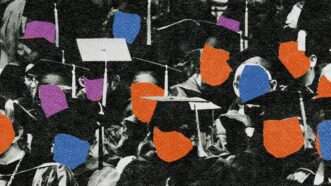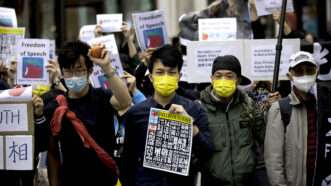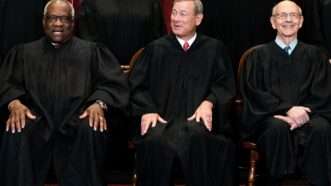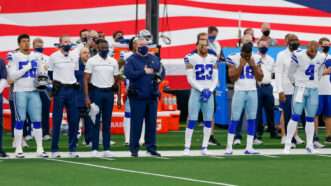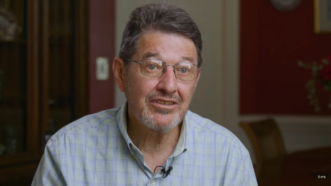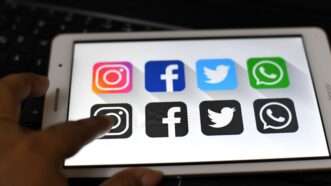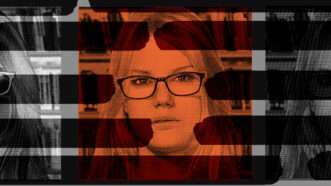Free Speech
Assignments Aimed at "Requiring a Statement" of Ideological Belief from Students May Violate First Amendment
So holds a Fifth Circuit panel (by a 2-to-1 vote), in an assignment requiring the writing of the Pledge of Allegiance, but the same argument would apply, I think, to compelled statements of other ideologies, whether related to patriotism, race, sex, sexual orientation, or anything else.
Lawsuit Over Nieman Journalism Lab (at Harvard) Outing Commenter Can Go Forward
The plaintiff is Francesca Viola, who wrote the comment when she was a journalism professor at Temple University.
Court Refuses Jail Guard's Request to Seal Civil Lawsuit Brought Against Him by Prisoner
"Bartolotti alleges that 'anytime you search [his] name on [the internet, he is] affiliated with this case,' which 'has affected [his] personal and professional lives [and] has become a safety issue at times as well.'"
Interpreting 47 U.S.C. § 230(c)(2)
The statute immunizes computer services for "action voluntarily taken in good faith to restrict ... availability of material that the provider ... considers to be obscene, lewd, lascivious, filthy, excessively violent, harassing, or otherwise objectionable, whether or not such material is constitutionally protected"—but what exactly does that mean?
New York Appeals Court Catalogs Rudy Giuliani's Election Lies As It Suspends His License to Practice Law
The suspension is based on "demonstrably false and misleading statements" that Giuliani made as Donald Trump's lawyer.
Fifth Circuit Certifies Questions in Doe v. Mckesson to Louisiana Supreme Court
This is the case against DeRay Mckesson, brought by a police officer who was injured in a protest that Mckesson allegedly organized.
Florida's College Intellectual Diversity Survey Is Good, Actually
No, it’s not an attempt to monitor faculty and student views. It’s an attempt to make sure they’re allowed to express them.
Trigger Warning Now Counts as Violent Language at Brandeis University
A way of warning someone they might feel offended is itself offensive?
Hong Kong's Free Press Is Dying
After Chinese authorities conducted newsroom raids and arrested top editors, pro-democracy publication Apple Daily realized it could no longer safely operate.
Does a New Florida Law Require State Universities to Monitor Faculty and Student Beliefs? (Updated)
Why is straight reporting on educational reform measures so difficult.
Journal of Free Speech Law Call For Papers: Symposium on the First Amendment and Student Speech
We'll be ready to publish articles on this subject as early as September, if you submit them by August 1.
High School Cheerleader's Profane Social Media Rant Is Protected Free Speech, Says SCOTUS
First Amendment advocates prevailed in Mahanoy Area School District v. B.L.
Man Arrested for Public Signs Wins Settlement From Sheriff's Office and Spurs Reform
Holding a sign in a public park should not cause an arrest.
Supreme Court Protects Students' "Political or Religious Speech" Outside School
The Court doesn't set forth a categorical rule protecting such speech, but strongly suggests that such speech is normally protected by the First Amendment—and defines political speech broadly, to include criticism (even vulgar criticism) of school programs and officials.
GB News Stands Up to U.K. Cancel Culture and Wins
Advertisers found that appeasing an illiberal mob wasn’t a safe choice after all.
Tim Wu, Biden's New Tech Guru, Is Deeply Wrong About What Makes the Internet Great
In many professional arenas, Wu's swings and misses would have consequences. In Wu's case, it landed him an advisory role in the Biden administration.
Is Microsoft 'Out To Get Conservatives'? And Is That Jim Jordan's Business?
Plus: Biden to back bill ending crack/cocaine sentencing disparity, the truth about tech startup creation, and more...
Colorado Court Slaps Baker With Fine for Refusing To Make Gender Transition Cake
Plus: Georgia's voting roll purge draws media hype, Florida's drug law hypocrisy, and more...
Government Action and Constitutional Rights
When (1) states seek to protect abortion rights / gun rights / speech rights against private restriction, and (2) Congress seeks to encourage such private restrictions by preempting the state law protections, might such federal preemption violate the Constitution?
States Move To Force Sports Teams To Play the National Anthem
Three states have advanced constitutionally questionable laws.
Retired Engineer Offers Free Expert Testimony for Flood Victims. Licensing Officials Threaten Him With Criminal Charges.
Wayne Nutt worked as an engineer for decades. But because he's not licensed, North Carolina's engineering board says that he can't share his expertise in public.
Ban on Broadcasting Court's Own Recordings of Criminal Hearings Likely Unconstitutional
The Fourth Circuit holds that Maryland's ban must be subject to strict scrutiny, a test that the prohibition is highly unlikely to satisfy.
Don't Ban Critical Race Theory in Education. Embrace School Choice Instead.
It's wrong for politicians to suppress important debates in schools. Instead let families have more control of their kids' educations.
No Heckler's Veto: Court Reverses $1.5M Nuisance Verdict Against Abortion Clinic, Which Was Chiefly Based on Actions of Protesters and Arsonists
A new decision from the Georgia Court of Appeals.
The PRO-SPEECH Act Is Anything but First Amendment-Friendly
The law would make a federal case out of every aggrieved internet user and compel companies to host messages they do not wish to platform.
Feds Seize CNN Reporter's Data, Then Gag CNN
If this doubly punitive anti-press maneuver sounds familiar, that's because it keeps happening, including to Reason.
The World Loves Free Speech—Except When They're Offended
Americans oppose restrictions, but report feeling less free to speak about political matters.
Eighth Circuit Agrees to Rehear Arkansas Anti-BDS Statute Challenge
The three-judge panel struck down the statute by a 2-to-1 vote, but now the entire Eighth Circuit will consider the case en banc.
N.C. County Removes Coca-Cola Machines from Government Facilities Because of Coke CEO's Speech About Georgia Election Law
This violates the First Amendment, I think; the government generally may not discriminatorily terminate (or refuse to renew) contracts based on the contractors' speech on matters of public concern.
FBI Backs Off Attempt To Subpoena Info on USA Today Readers
Plus: America's love-hate relationship with booze, Twitter CEO says "bitcoin changes absolutely everything," and more...
Don't Try To Fix Big Tech With Politics
I don't know the correct level of content moderation by Facebook, Twitter, Google, or Amazon, and neither do you.
Why Millennials Hate Free Speech and What To Do About It
The creator of ultra-woke poet Titania McGrath makes the case against cancel culture.


